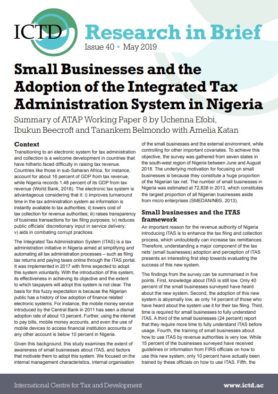Research in Brief 40
Transitioning to an electronic system for tax administration and collection is a welcome development in countries that have hitherto faced difficulty in raising tax revenue. Countries like those in sub-Saharan Africa, for instance, account for about 16 percent of GDP from tax revenue, while Nigeria records 1.48 percent of its GDP from tax revenue (World Bank, 2018). The electronic tax system is advantageous considering that it: i) improves turnaround time in the tax administration system as information is instantly available to tax authorities; ii) lowers cost of tax collection for revenue authorities; iii) raises transparency of business transactions for tax filing purposes; iv) reduces public officials’ discretionary input in service delivery; v) aids in combating corrupt practices. The Integrated Tax Administration System (ITAS) is a tax administration initiative in Nigeria aimed at simplifying and automating all tax administration processes – such as filing tax returns and paying taxes online through the ITAS portal. It was implemented in 2017 with firms expected to adopt this system voluntarily. With the introduction of this system, its effectiveness in achieving its objective and the extent to which taxpayers will adopt this system is not clear. The basis for this fuzzy expectation is because the Nigerian public has a history of low adoption of finance related electronic systems. For instance, the mobile money service introduced by the Central Bank in 2011 has seen a dismal adoption rate of about 13 percent. Further, using the internet to pay bills, mobile money accounts, and even the use of mobile devices to access financial institution accounts or any other account is below 10 percent in Nigeria. Given this background, this study examines the extent of awareness of small businesses about ITAS, and factors that motivate them to adopt this system. We focused on the internal management characteristics, internal organisation of the small businesses and the external environment, while controlling for other important covariates. To achieve this objective, the survey was gathered from seven states in the south-west region of Nigeria between June and August 2018. The underlying motivation for focusing on small businesses is because they constitute a huge proportion of the Nigerian tax net. The number of small businesses in Nigeria was estimated at 72,838 in 2013, which constitutes the largest proportion of all Nigerian businesses aside from micro enterprises (SMEDAN/NBS, 2013). This is a summary of ATAP 8 by Uchenna Efobi, Ibukun Beecroft and Tanankem Belmondo with Amelia Katan.
